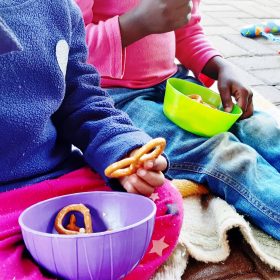The National Income Dynamics Study – Coronavirus Rapid Mobile Survey (NIDS-CRAM) released its most recent findings on hunger in South Africa on 17 February 2021. In terms of child hunger, the proportion of households with children who reported a child going hungry at least once during a period of a week rose from 12% in Wave 2 to 16% in Wave 3.
For children without family members, especially, securing food on a daily basis is a huge challenge. In 2018, the Children’s Institute reported that 55,000 children lived in a total of 33,000 child-only households in South Africa. They also found that close to 70% of children in child-only households live in three of South Africa’s nine provinces: KwaZulu-Natal, the Eastern Cape and Limpopo. Recent statistics regarding Covid-19 related deaths, unemployment, business confidence and our struggling economy show the degree to which the pandemic has increased the number of vulnerable people across the country.
For many orphaned and vulnerable children, getting support from extended family members or being fostered or adopted is not often possible or takes a very long time to come to fruition. In such cases, centres that care for orphaned and vulnerable children (OVC), like iKhaya LikaBaba in Empangeni, play a crucial role in providing for their needs and nurturing their development. Without the support of OVC centres, orphaned and vulnerable children have no safety net to rely on.
OVC centres, like so many other organisations in the non-profit sector, have to compete with each other from a shrinking pool of corporate donations. According to the corporate responsibility consultancy Trialogue, the proportion of social and community development budgets that have been directed to orphans and vulnerable children by corporates has declined from 23% in 2019 to 14% in 2020.
Despite the pandemic wreaking havoc across all sectors of our economy and society, FoodForward SA, in partnership with their supply chain partners, was able to recover over 7,000 tons of food, translating into 28 million meals, through its national distribution network of over 1,000 registered and vetted beneficiary organisations (BOs).
“Supporting organisations that care diligently for orphaned and vulnerable children is a priority for FoodForward SA, says Andy Du Plessis, the organisation’s managing director. Collectively, the 111 OVC centres that are part of our national network serve 51,763 beneficiaries each day. FoodForward SA also supports 108 after-care facilities and 201 ECD centres that collectively reach 116,030 beneficiaries daily. These organisations play a vital role in providing safe spaces for at-risk children,” says Andy Du Plessis.
“After joining our network, these organisations receive nutritious surplus food each month, which significantly reduces their monthly grocery bill,” says Du Plessis. In the case of iKhaya LikaBaba, the money they save is used for offering, among others, counselling services. “Counselling is required, regularly, when raising children with traumatised backgrounds,” says one of iKhaya LikaBaba’s coordinators, Loressa Kritzinger. In 2020, FoodForward SA helped iKhaya LikaBaba serve 32,850 meals and 21,900 snacks.
iKhaya LikaBaba, established by Sean and Mel Grant in 2007, joined FoodForward SA’s network in May 2014 to help them provide healthy meals to the children that live at the centre. “This is their home. We provide for every aspect of their upbringing, including housing, security, clothing, meals, education, health, and transport as well as meeting their spiritual, emotional and social needs. Having a partnership with FoodForward SA means we have a reliable source of donated groceries,” says Kritzinger. “We provide our children with three nutritious meals and two snacks daily to ensure they grow well and remain healthy.”












